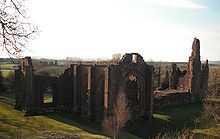Lincluden Collegiate Church

Lincluden Collegiate Church, known earlier as Lincluden Priory or Lincluden Abbey, is a ruined religious house, situated to the north of the Royal Burgh of Dumfries, Scotland. Situated in a bend of the Cluden Water, at its confluence with the River Nith, the ruins are on the site of the Bailey of the very early Lincluden Castle, as are those of the later Lincluden Tower. This religious house was founded circa 1160 and was used for various purposes, until its abandonment around 1700. The remaining ruins are protected as a category A listed building,[1] and as a scheduled monument.[2]
Priory of Lincluden
Foundation
The foundation of the priory is accredited to Uchtred (d.1174) who had co-ruled Galloway with his brother Gille Brigte. Uchtred did not have the benefit of the relative peace of his father's reign in Galloway. Fergus of Galloway (d.1161) had founded such establishments such as Soulseat Abbey, St Mary's Isle Priory, Dundrennan Abbey, the foundation at Kirkcudbright (Kirk of St. Cuthbert) and re-established the foundation at Whithorn, the historic community of St Ninian. Uchtred's focus of power was in eastern Galloway, while his brother's was in the west, their reigns were marked by turbulent relationships between themselves, the Irish Kings of Ailech, the King of Scots, William the Lyon, and the King of England, Henry II. Lincluden was the only monastic house that Uchtred would found, meeting his death at the hand of his brother in 1174.[3]
Prior to the foundation of Lincluden, there had been only been houses of Monks in Galloway, Uchtred's new house was the first nunnery within the Lordship. The first intake of religieuses were probably Cluniac sisters from France or England, later being supplemented by local novices.
Douglas Patronage
In the late 14th century the area became part of the fief of Archibald the Grim, Lord of Galloway, and latterly 3rd Earl of Douglas. The nuns at Lincluden had reputedly broken their vows of chastity and were guilty of licentious behaviour, Douglas with an eye on the revenues from the priory, sat in judgement over them and found them guilty.[4] He dismissed the nuns from the priory. Pehaps penitent at the expulsion of the nuns, Earl Archibald ordered the construction of a new church to be built, and set up a College consisting of a Provost and twelve Canons.[5]
Following the capture of Archibald Douglas, 4th Earl of Douglas at Battle of Homildon Hill, and his later capture at the Battle of Shrewsbury, the Earl spent some time as a prisoner of Henry IV of England where he struck up a friendship with the King. This is evidenced by an open letter of 20 April 1408 from Henry to all his northern castellans. This forbids them, should they enter Scotland for military purposes, from harming or damaging persons or property pertaining to the College of Lincluden for a period of three years.[6]
Earl Archibald and his successors spent a great deal of money on ornamenting the church, and there are many fine armorial carvings still within the ruins.[7] Still extant is the tomb of Princess Margaret, Countess of Douglas and Duchess of Touraine, the daughter of Robert III of Scotland and wife of Archibald Douglas, 4th Earl of Douglas.
References
Notes
- ↑ "Lincluden Collegiate Church: Listed Building Report". Historic Scotland.
- ↑ "Lincluden College, motte and precinct". Historic Scotland.
- ↑ Chronicles of Lincluden, Chap. 1
- ↑ MacDowall, p 51
- ↑ Fraser, vol I p349
- ↑ MacDowall, pp 59-60
- ↑ Maxwell, vol I, p148
Sources
| Wikimedia Commons has media related to Lincluden Collegiate Church. |
- Balfour Paul, Sir James. The Scots Peerage, IX Vols. Edinburgh 1907
- Fraser, Sir Williiam The Douglas Book IV vols, Edinburgh 1885
- MacDowall FSA, Willam. Chronicles of Lincluden- as an Abbey and College. Edinburgh 1886
- Antiquities of Scotland. Vol.2. by Francis Grose.